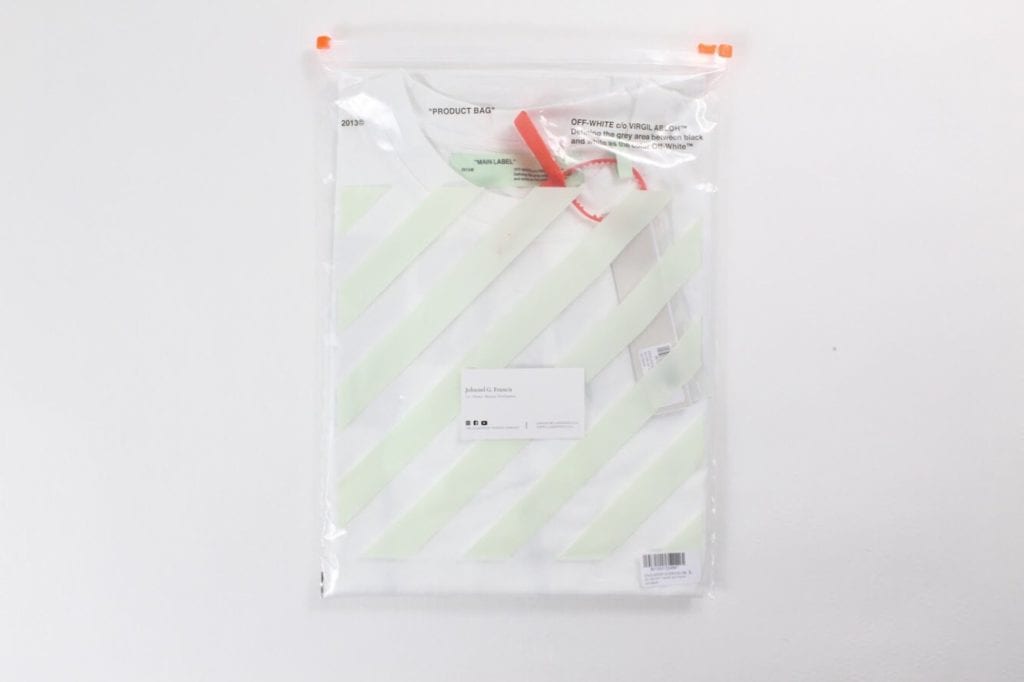Off-White is going there. After counsel for Virgil Abloh’s buzzy designer label asserted legal rights in his particular brand of quotation marks in the since-settled lawsuit they filed against a bracelet company this spring, the brand’s legal team has filed a mass of trademark applications over the past several months. In addition to seeking registrations for stylized versions of the word “OFF” for use on things, such as “ashtrays, cigarette lighters, electronic cigarettes, cigarette filters, tobacco pipes, and cigarette holders,” and the placement of arrows on the side of a sneaker, Off-White is claiming exclusive legal rights in one specific use of quotation marks.
According to a trademark application for registration that counsel for Abloh’s Milan-based brand filed with the U.S. Patent and Trademark Office (“USPTO”) in May, Off-White is seeking a registration for the words “Product Bag” along with the quotation marks surrounding it, which it is using – and has been using, according to the application, since 2016 – on clothing, namely “tops [and] bottoms.”
While trademark protections are capable of extending to nearly any word, name, symbol, or design, or any combination thereof, that is used in commerce to identify and distinguish the goods of one company from those of another, Off-White’s quest for a federal registration is hardly a done deal. On the heels of the application being filed, the USPTO issued an Office Action – a letter notifying an applicant about issues with his/her application – and preliminarily refused the application.
In the August letter, USPTO examining attorney Drew Ciurpita took issue with the mark because based on the specimen (i.e., a photo of how the trademark is being used) that Off-White’s counsel submitted to the USPTO, “the applied-for mark … does not function as a trademark.” In other words, the “Product Bag” mark does “not indicate the source of [Off-White’s] goods,” nor does it “identify and distinguish [Off-White’s goods] from [those of] others.”
That is primarily because the specimen in which the “PRODUCT BAG” mark appears is … a product bag. It is what Off-White products are packaged in. As such, Ciurpita asserted that the mark “merely references” – or describes – “the packaging for the goods,” as opposed to “creat[ing] a connection between the mark and the goods identified in the application,” including “tops [and] bottoms.”
That connection between a mark and the goods associated with it is critical, as “whether a designation functions as a [trademark] depends on the commercial impression it makes on the relevant public; that is, whether purchasers would be likely to regard it as a source-indicator for the goods,” per Ciurpita. That is lacking here in his mind: instead of perceiving the “PRODUCT BAG” mark as an indicator of the Off-White brand, the USPTO attorney says that “consumers will perceive the mark as merely providing information about the packaging, which is a clear plastic bag.”
With this in mind, Ciurpita has invited Off-White to submit an alternative specimen – one that in which “PRODUCT BAG” does not appear on a product bag.
It will be interesting to see whether Off-White’s “PRODUCT BAG” mark will prove to be a jumping off point for the brand to claim broader rights in quotation marks (as we predicted back in 2017), which is precisely what the brand did in the lawsuit that it filed against bracelet brand Rastaclat when it claimed “significant common law trademark” rights in both its red zip tie and use of quotation marks.














